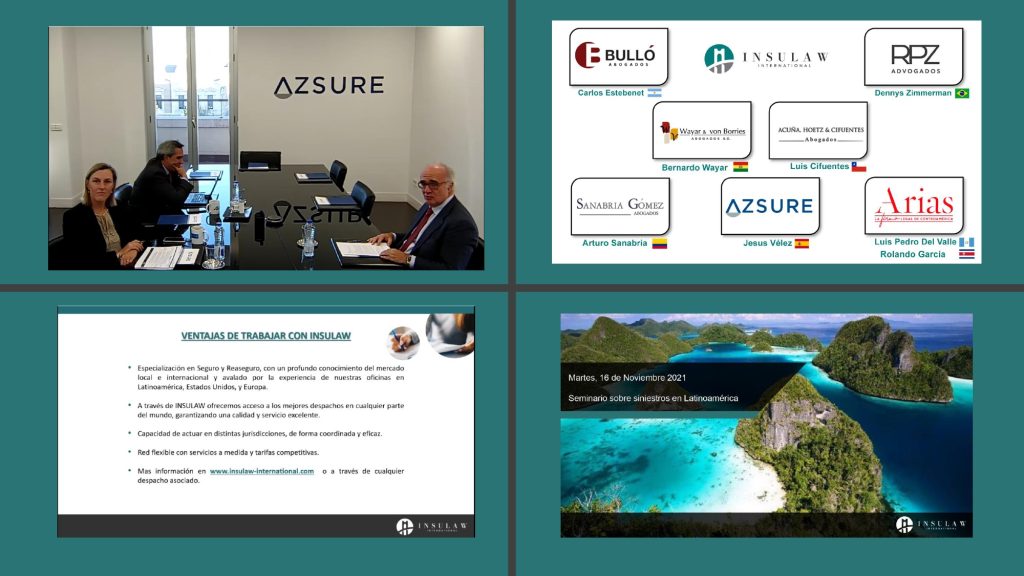Last Tuesday 16 November INSULAW INTERNATIONAL organised its first seminar on claims in Latin America. Coinciding with this seminar, the international network of law firms specialised in insurance law, moreover, announced the launch of its website: www.insulaw-international.com.
The seminar was opened by the current president of INSULAW INTERNATIONAL, and managing partner of AZSURE ABOGADOS, Jesús Vélez, who presented the countries in Latin America, North America and Europe in which the association is present, pointing out that there will soon be new incorporations of offices in Australia and Asia. The network currently has 42 offices in 30 jurisdictions, which include more than 1,200 lawyers around the world.
INSULAW INTERNATIONAL’s objective is to be present in all jurisdictions where its clients’ interests are at stake, in order to respond to the growing demand for insurance-related legal services in today’s globalised world.

The main areas of specialization of the network are construction, property, energy, financial lines (D&O and professional liability), industrial risks, M&A insurance, transport, international trade, health and employment, among others.
The first presentation was given by Luis Cifuentes, partner at Acuña, Hoetz & Cifuentes, an associated firm in Chile, who commented on the ruling of the Chilean Supreme Court in the Chubb v. La Polar case. The U.S. insurer initiated legal action against this company, leader in the Chilean market, dedicated to multi-store services and 19 former administrators and executives, requesting the annulment of the directors’ and managers’ civil liability insurance that would cover the expenses of the legal proceedings initiated. The insurance company based its claim on the fact that for the renewal of the policy, La Polar provided the insurer with false and incomplete information about the company’s assets and financial situation. The ruling of the country’s highest court confirmed the nullity of the policy declared in the first instance by the Civil Court and, subsequently, by the Court of Appeals of Santiago. The result of this judicial process meant a saving for the insurer of a total of five million dollars.
The second presentation was given by Dennys Zimmermann, managing partner at RPZ ADVOGADOS, the law firm associated with the network in Brazil, who spoke on the subject of large risks insurance in Brazil. Following the new regulation on this subject, large risks in Brazil are considered to be those relating to a specific subject of insurance (purchase and supply of oil, property, air navigation, maritime, nuclear risks and also credit and surety). D&O insurance can also be classified as large risks depending on the type of loss and insured company:
- Maximum limit of coverage equal to or greater than 15 million Brazilian Reais, approximately US$3 million.
- Total assets in excess of R$27 million.
- Gross sales in excess of R$ 57 million.
In addition, the new legislation extends the possibilities of large risks insurance to all those insurance policies in which there is more than one policyholder or one insured. In general, the new legislation contains a great deal of flexibility for the contracting parties to set the conditions applicable to such insurance policies, which also do not have to be registered or recorded in any public file or register.
The third presentation was given by Carlos Estebenet, partner at BULLÓ ABOGADOS in Argentina and member of INSULAW, who dealt with the problem of international insurance programs. Nowadays, the globalization process has generated that not only large multinationals have interests in different countries, but also small and medium-sized companies, which have branches in other jurisdictions. International programs allow the coverages established by the parent policy to be applied to local risks in an integrated manner. The parent policy operates in excess of the sums insured locally and sometimes in excess of certain risks that cannot be covered by local law. International programs allow for the unification and strategic overview of insurable interests distributed in different parts of the world. However, one of the problems they present is the determination of the amount of the premium and the sums insured, and also the limitations that local laws may impose on master policies, which have been adopted with the purpose of unifying coverage applicable to all countries in which the subsidiaries reside. In Argentina, the law provides that all local risks must be covered by an insurance company incorporated under Argentinian law, which entails the imposition of penalties for non-compliance with this requirement. Another fundamental point is that such international programs in Argentina have to be approved by the supervisory authority. There are regulatory issues that have complicated the international program, such as the exchange regime applicable to the payment of premiums and the need for all premium payments in foreign currency to be subject to the exchange market.
The fourth presentation was given by Bernardo Wayar, partner of Wayar & Von Borries, Abogados, the firm that represents the association in Bolivia. Bernardo Wayar developed the topic of insurance arbitration in Bolivia. One of the main issues to be discussed is that in Bolivia arbitration can only be appealed if there is an argument that justifies its challenge due to a defect of nullity. The main advantages of arbitration over the jurisdiction of the Bolivian courts are that arbitration is more agile than the judicial function, it is resolved earlier, the arbitrators are more specialized in insurance law than ordinary judges, it is more balanced in terms of the possible ruling, and the costs if processing are lower than the costs of a lawsuit before ordinary courts. However, it also has disadvantages, such as the existence of abusive clauses that are null and void if they affect any fundamental right, and in case of discrepancy or doubt, this must always be resolved in favour of the insured. The non-payment of the premium in Bolivia does not produce the suspension of its effects automatically. The effect of the coverage suspension of the insurance coverage does not operate automatically, only after respecting previous notification obligation to the insured and public entity of supervision.
The fifth presentation was given by Arturo Sanabria, managing partner of Sanabria Gómez Abogados, a partner of INSULAW in Colombia, who spoke about the insurance of Financial Institutions in Colombia and the duty of information to the insured. The current regulations on financial consumer protection in Colombia establish that the latter, being the weaker party in the relationship with financial institutions, and more specifically with insurance companies, must receive a more qualified protection by law. The 2009 law defines in a general way that the consumer of financial products is any person who is a client or potential client of a financial institution, so it would be sufficient for this purpose that the person has a contact with a provider. The Colombian Constitutional Court, however, determined a unification of the concept of financial consumer, defining it as the final recipient of a product or service. For the constitutional court, if a person has contact with a financial entity, this does not mean that he or she is a consumer, but rather that he or she must satisfy his or her own need or a need intimately linked to his or her activity. It is not clear who is considered a financial consumer in Colombia. What is desirable is that this consumer is the final recipient of a product, that he/she develops a business purpose linked to his/her economic activity, and that he/she has a situation of asymmetry with respect to the financial entity.
Finally, the last presentation, entitled “Cyber Risks Insurance in Central America. Treatment of claims in Costa Rica and Guatemala”, was developed by Luis Pedro del Valle and Rolando García, partner and senior associate of the firm ARIAS in these two countries, who represent the association in Central America. It is clear that nowadays technology, despite serving as a tool for the development of companies and institutions, has weaknesses that make it vulnerable to external attacks. There are several ways to address this problem. Risks must be examined through a careful analysis of the security strategy at all levels, such as: financial, legal, human resources, ensuring proper use of technology by employees. When subscribing to these policies, the existence of prevention and response plans for possible claims must be analysed. The robustness of the network is a critical factor. Coverage is three-dimensional: it covers the insured’s own damage claims and third-party claims suffered as a result of the failure of computer controls. Also covered are the expenses of experts, consultants and lawyers hired in the event of a cybersecurity incident.
The most common incidents are information theft or malware attacks, which prevent the companies that suffer from accessing their personal files and demand a payment or ransom to gain access to their files. These incidents can cause the operational paralysis of the company.
There are two very relevant elements when assessing risk:
- Having precise knowledge of what information the policyholder has (personal data, medical information): determining whether the information is essential.
- Existence of a technological infrastructure that the policyholder can count on for the safeguarding of the information that its client has deposited with it. The existence of this structure is not enough to avoid an incident, as the insurer has to explore whether this structure is managed in an adequate manner.
Helping to avoid failures in the use of technology will influence not only the risk assessment, but also the determination of exclusions of coverage and the calculation of the premium to be paid.
AZSURE Lawyers would like to thank all those who attended the event, the speakers and the members of INSULAW INTERNATIONAL.

